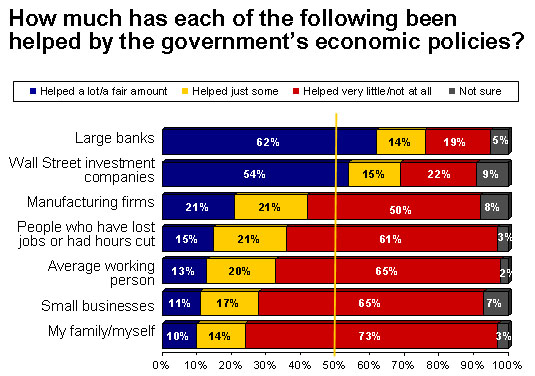Longtime political analyst Charlie Cook thinks there’s a good chance that Democrats could lose control of Congress in next year’s midterm elections. Independent voters, he says, are “viscerally” worried about the deficit and hyperactive government.
I wonder. The deficit is a pretty abstract thing, and “hyperactive government” doesn’t necessarily mean healthcare and the stimulus bill. When it comes to voter discontent, I think I’d put my money elsewhere. First, as the chart below, from the Economic Policy Institute, shows, people are pretty strongly convinced that the finance industry has gotten huge amounts of help from Obama and Congress, while ordinary people have gotten squat. As Ezra Klein says, “The economic logic behind preserving the financial sector was bulletproof. But the electorate is not composed of economists. And all they know is that the banks got a lot of money, and this is the worst recession in memory.” In other words, “hyperactive” might be a lot more acceptable if all that activity were aimed somewhere other than Wall Street.
Second, there’s jobs. John Judis tells the story here: if you want to be a popular president, you’d better be able to demonstrate some job growth. End of story. Obama still has some time on that front, but probably not very much. If the economy is starting to recover by next spring, he and the Democratic Party will probably be in decent shape when the midterms roll around. If not, not.
















